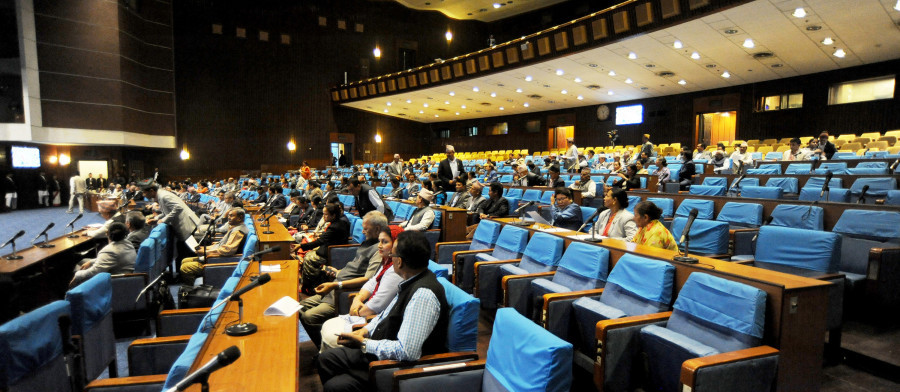Politics
Lower House meeting gets adjourned due to lack of a quorum
The House of Representatives was scheduled to endorse four bills that have been pending since the previous session.
Binod Ghimire
The meeting of the House of Representatives scheduled to endorse four bills that have been pending since the previous session was adjourned on Tuesday for the lack of a quorum.
The Parliament Secretariat records show 182 lawmakers were present when the House commenced at 1 p.m. However, two-thirds of them –112—had left, when discussions on the bills started after the zero-hour and special-hour. Their total numbers stood at 70 when the Minister for Finance, Yubaraj Khatiwada, tabled the bill on Bank and Financial Institutions for the discussion, only one above the minimum requirement of 69 members.
Article 94 of the Constitution of Nepal has fixed one-fourth as the quorum for both the Houses in the federal parliament. However, when Speaker Agni Sapkota allowed Khatiwada to present the bill for the endorsement, Nepali Congress lawmaker, Atahar Kamal Musalman objected, saying the House lacked the quorum. The headcount subsequently showed only 58 lawmakers were present in the House, which was inadequate to table the bill. Sapkota stalled the meeting for 15 minutes expecting more lawmakers would show up, but to no avail.
“The House meeting was adjourned until Wednesday as there was no sign of adequate presence even after 15 minutes,” Gopal Nath Yogi, secretary of the Lower House, told the Post. Along with the bill on Bank and Financial Institutions, the Tuesday’s meeting was scheduled to endorse an amendment bill to some Nepal Acts Related to Education, an amendment bill to Seeds Act and a bill on the amendment to Plant Protection Act.
Formulation of laws and deliberations on the bills introduced by the government is the main job of lawmakers. Similarly, in principle, it is the responsibility of the ruling party to ensure the House functions smoothly and endorses the bills presented by its government. The ruling Nepal Communist Party has 174 lawmakers, which is two and a half times higher than the minimum presence required in the 275-member House, to perform its job.
However, Dev Gurung, the chief whip of the party didn’t take the matter seriously. When asked if he would inquire why the party’s lawmakers weren’t available during the deliberations, Gurung said: “It could be done, if needed.”
The winter session of Parliament has at least four dozen bills, including those crucial for the implementation of the statute, to endorse, before it adjourns.
Records in Parliament show that at least 25 bills from the last session need to be endorsed. Of them, two are at the National Assembly, while eight others are being studied by the lawmakers. Similarly, 15 of them tabled by the government during the budget session are under consideration with different House committees.
In addition to the backlog, there are 29 bills, including bills on Establishment, Registration and Operation of the Civil Society Organisations, Mass Media, and Public Service Broadcasting, awaiting the Cabinet’s approval. The bills, after being cleared by the Ministry of Law, Justice and Parliamentary Affairs, need to be approved by the Cabinet, before they are registered at the Federal Parliament for endorsement.
The House has already wasted over a month as the ruling party failed to find its candidate for Speaker, on time. Though the President called the House session from December 20, it came to function only over a month later, on January 24, after the ruling party agreed on Sapkota’s name for speaker.
The local and provincial governments haven’t been able to work full-fledged due to the lack of Federal Civil Service, Federal Education and Federal Health Acts. Political experts say it is a case of sheer negligence on the part of the ruling party and lawmakers. They say the lawmakers have become careerists rather than people’s representatives. “The lawmakers are for making the laws but for our representatives that isn’t a priority,” Chandra Dev Bhatta, a political commentator, told the Post. “A parliamentary democracy can never be strong unless the lawmakers perform their main duty.”




 13.12°C Kathmandu
13.12°C Kathmandu














